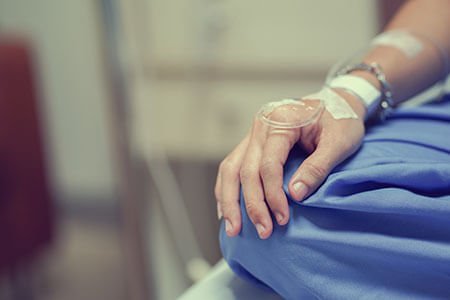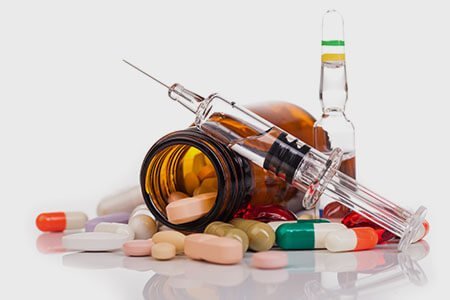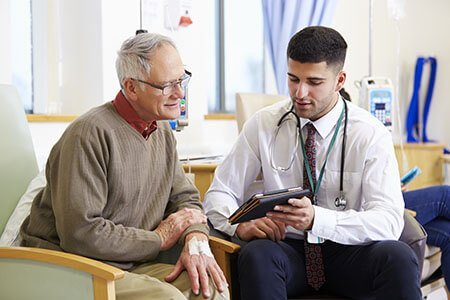Chemotherapy
Side effects, Cost, Types and Procedure
An easy-to-read guide to Chemotherapy
What is chemotherapy?
Chemotherapy, also known as chemo, is a commonly used treatment for cancers. It consists of administration of a single type of medication or a combination of a few medications. As chemotherapy is usually given through the intravenous (IV) route, it reaches the whole body and affects the entire body.
Chemotherapy is intended to either stop or at least slow down the growth of cancer cells. The medicines used in chemotherapy affect the cell cycle and the ability of cells to grow and divide thus help in controlling the growth of abnormal cells.

What is chemotherapy?
What are the treatment goals of chemotherapy?
Depending on each patient’s medical condition and severity of the disease, the goal of chemotherapy may vary. Chemotherapy is generally advised for one of these reasons:
- To cure cancer: Intended to kill or eliminate the cancer cells totally from the body.
- To control the growth or spread of cancer: Intended to prevent cancer from spreading, slow down its growth, or destroy any cancer cells that may have spread to areas other than the original site.
- To ease the symptoms of cancer with poor outcome or prognosis, also known as palliative Eg: tumor shrinking, reduce nausea and vomiting, achieve a better quality of life.
What are the types of chemotherapy?
Chemotherapy treatment may be used for cancer management alone or in combination with other modes of treatment, such as
- Neoadjuvant chemotherapy, chemotherapy used before the surgery or radiation therapy to shrink the tumor.
- Adjuvant chemotherapy, chemotherapy used after surgery or radiation therapy to destroy the remaining cancer cells.
Sometimes, chemotherapy may also be administered adjuvant to biological therapies, such as antibodies or vaccines.
How does chemotherapy work?
There are hundreds of chemotherapies (medicines acting against cancer) and different ways by which they act. Some of the ways chemotherapy works include:
- Alkylating agents – Reduce reproduction of DNA damage (mutations). They find utility in different cancers of lung, breast, ovaries, blood as well as Hodgkin disease, multiple myeloma and sarcoma.
- Antimetabolites – Affect the growth of defective DNA and RNA. These agents are commonly used to treat leukemias and GI cancer.
- Anti-tumor antibiotics – Affect division of cancerous DNA by interfering with the enzymes of DNA copying.
- Mitotic inhibitors & topoisomerase inhibitors – Impair process of cell division.
Innovations in anticancer research have resulted in effective treatments such as –
Targeted therapies – Chemotherapeutic drugs are laced with substances that specifically carry themselves to the tumor or cancer site. These substances include proteins, receptors, or antigens specifically act on cancer cells thus allowing the chemotherapy to show localized effect. This way the normal cells in the nearby structures remain unaffected and the patient experiences fewer side effects.
Differentiating therapies – These medicines act by differentiating the cancerous cells into normal cells.
Immunotherapies – Certain cancer vaccines and cell therapies are directed to provoke the immune system to attack cancer cells and destroy them.
Hormone therapies – Hormone-like medicines help to reduce the growth of breast, prostate and endometrial cancer that respond to natural sex hormones in the body.

How does chemotherapy work?
What are the side effects of chemotherapy?
Generally, the target for chemotherapy and radiation therapy is the rapidly growing cancer cells. However, at times, the healthy cells get affected too. The side effects of chemotherapy are generally due to the effect of the medications on normal cells. Some of these are:
- Alopecia or loss of hair
- Anemia
- Fatigue
- Memory issues
- Mouth sores or ulcers
- Neutropenia or low number of white blood cells that help fight infections
- Thrombocytopenia, or low number of platelets that help in clotting of blood
- Vomiting, nausea and diarrhea
Sometimes, chemotherapy may cause pain –
- Headaches
- Muscle pain
- Abdominal pain
- Pain due to nerve damagefelt as sharp shooting pain, burning or numbness in the fingers and toes
In the majority of cases, pain may get better or go away. However, nerve pain generally may take a long time or may remain persistent.
Some of the side effects of chemotherapy like anemia, febrile neutropenia, thrombocytopenia, fatigue, and nausea and vomiting can be serious. Fatigue, nausea, hair loss etc are commonly seen side effects of radiation.
How is chemotherapy administered?
Chemotherapy is often administered or given to the patient multiple times over a period of weeks or months. This duration is known as the ‘course of treatment’. During the course of treatment, a series of treatment periods may take place, which is called as ‘cycles’. Chemo may be administered every day or for specified days within these cycles. Sometimes, the chemo days or cycles are followed by periods of rest to allow the body recover and produce new healthy cells.
Depending upon the goal of treatment, the medical oncologist will determine the plan and regimen (type and dosage) of chemotherapy.
Some of the commonly advised chemotherapy regimens or combinations include:
- ABVD chemotherapy
- FOLFOX chemotherapy
- CHOP chemotherapy
What are the factors to be considered before choosing chemotherapy?
It is important to understand the pros and cons of chemotherapy. The oncologist will discuss the benefits, risks and side effects of the chosen chemotherapy. Only after the patient provides the consent will the medical oncologist begin chemotherapy.
So, here are few points one can ask their doctor:
- The chemotherapeutic agents used
- Method of use – IV or oral
- Number of courses and cycles
- Treatment goals and how to find out if it works
- Possible side effects and risks
- Effect of chemo on work and physical activities
- Effect of chemo on fertility and ability to conceive
- Any other treatments – radiation or surgery

Factors to be Considered before choosing Chemotherapys
What are the factors that affect the cost of chemotherapy?
The cost of chemotherapy is dependent on the following:
- The types and doses of chemotherapeutic agent used
- Frequency and chemotherapy cycle
- Place of administration
- Location of the service provider
To know more about chemotherapy, you can request a callback and our chemotherapy specialist will call you and answer all your queries.
References
- Mayo Clinic. Chemotherapy. Available at:https://www.mayoclinic.org/tests-procedures/chemotherapy/about/pac-20385033 Accessed on January 26th, 2018.
- American Cancer Society. How Is Chemotherapy Used to Treat Cancer? Available at: https://www.cancer.org/treatment/treatments-and-side-effects/treatment-types/chemotherapy/how-is-chemotherapy-used-to-treat-cancer.html Accessed on January 26, 2018.
- US National Library of Medicine. Cancer Chemotherapy. Available at:https://medlineplus.gov/cancerchemotherapy.html Accessed on January 26, 2018.
- National Cancer Institute. Chemotherapy to Treat Cancer. Available at: https://www.cancer.gov/about-cancer/treatment/types/chemotherapy Accessed on January 26, 2018.
Disclaimer:
“The content of this publication has been developed by a third party content providerwho are clinicians and/or medical writers and/or experts. The information contained herein is for educational purpose only and we request you to please consult a Registered Medical Practitioner or Doctor before deciding the appropriate diagnosis and treatment plan.”



 Appointment
Appointment Second Opinion
Second Opinion WhatsApp
WhatsApp Call
Call More
More





